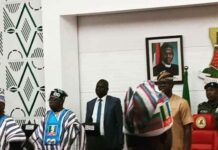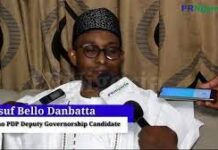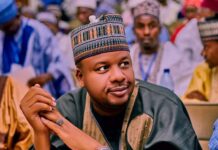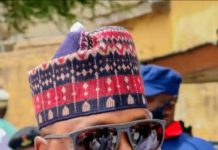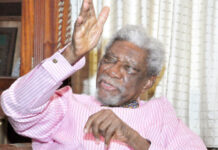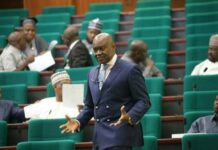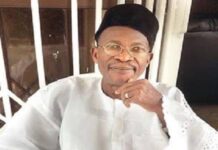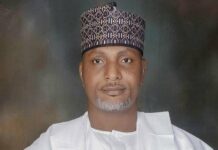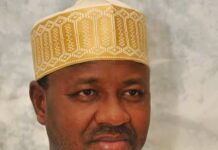INTERVIEW: Some Nigerians Trying to Create Collision Between Executive and Legislature –Fayemi
POLITICS DIGEST – Governor Kayode Fayemi of Ekiti State recently addressed a number of national issues in a media chat and spoke on his party’s performance, restructuring, minimum wage, state police, and states’ joint accounts with local governments. Excerpt:
Almost five years of All Progressives Congress (APC)-led government, the general belief among Nigerians is that nothing seems to have changed, as the people are yet to witness the change your party promised, when it came to power in 2015. How would you react to that?
But the fact is that Nigerians just re-elected the APC-led Federal Government for a second term. Of course, you will agree with me that election is the best option of measuring performance by political parties, as we haven’t devised any other means to judge political parties. You may argue on the fairness and credibility of the processes of the recent presidential election, but there is only one vehicle of sorting it out. The jurists are still on that; there is still one leg to go, so we won’t push that any further. But, let me come back to your substantive question that concerns every Nigerian and which is: How far has APC gone in taking Nigeria out of the woods? I think it is fair to say that it is work in progress. We are exactly not where we ought to be, but we are also not where we were in 2015, when our party took over.
No doubt, there are things that are in our manifesto, which for one reason or the other that we have not done, particularly on issues such as restructuring. But, when you put that in proper perspective, the power to do that resides with the legislature; it doesn’t reside with the executive. However, a determined executive can still push the legislature to do it. You know what happened in our first four years; there was no synergy between the executive and legislature and sometimes I wonder if Nigerians even want synergy between the two arms of government.
I think Nigerians sometimes behave as if they want enmity of some sort. They think that progress will come if the two arms are not on the same page, but I believe that we have seen the result of that from the Bukola Saraki-led Senate and the Muhammadu Buhari presidency. That clearly contributed to the slow pace of activities during the first term. For me, growth is key, but stability is probably what most Nigerians are interested in right now, because it is when we suffer a reversal that we will know how much progress that has been made.
To what extent has the feeling you had when you were leaving Ekiti government house in 2014 influenced your actions in your second term as governor of the state?
Naturally, the reason why people seek for a second term in office, in my view, is to consolidate on their achievements. Theoretically and practically from my experience in Nigeria, you can do a lot and you can also do a little if you worked out an agenda before you come into office. By the time I was leaving, my state had the highest enrolment of children in school with about 96 per cent; it had the lowest maternal mortality, child mortality and they were not accidental because when you looked at what happened four years after I was out of office, we fell to the lowest in terms of enrolment of children in school in the South-West.
In just a period of four years, maternal mortality went up, child mortality also went up. And it is easy to see why these happened. I ran a free and compulsory education programme, but my successor came in and introduced education levies and fees. The consequence was that those who could not afford it, stayed away. So, you can see a correlation why enrolment dropped and retention also dropped. Even some of those who were in school and were asked to go and look for West African Examination Council (WAEC) and National Council on Education (NECO) fees, which I paid for the four years I was governor had to drop out of school. These are things that we don’t often pay much attention.
Again, the N5,000 that I was paying to the elderly may not mean much to somebody in Lagos, but in Ekiti, it meant much as some of those elderly people even saved out of the money after taking care of themselves and were also able to contribute to other things, including taking care of their grandchildren or even their children who had no jobs. So, in terms of human capital development indices, it wasn’t perfect, but we achieved close to what we would have loved to. However, in terms of opening up Ekiti, which was my major priority, we tried to make the state a destination for business and tourism by doing Ikogosi and other things. Before I left, we hosted the NNMA and the Future Awards in Ikogosi. Several Nollywood movies were filmed there.
In doing this, we had challenges and these challenges tied in to our status as a state within a federation. Of course, there were a lot of things that I started, which were abandoned by my successor; not just about education and healthcare, but also about infrastructure. Virtually every project that was ongoing then was stopped by my successor and left for four years in abeyance. It was only when I came back that I restarted them. The disadvantage of that is that instead of moving on with new things, we are going back to resuscitate and rebuild schools, hospitals as well as Ikogosi, which was running before we left.
For me, I don’t want to dwell on that because it generates negative energy. That is why I have basically refrained from the usual blame-game and exchanges over probe and others because what the people want is good government. Yes, people must account for their time in office, but there are mechanisms in place that should do that without distracting occupants of the office and that is basically the advice I have been giving to my colleagues as chairman of Nigeria Governors’ Forum (NGF). I’ve had cause to sit down with incoming and outgoing governors to resolve issues in the interest of their state.
Once you start this rush to the law courts, it never ends and you won’t even have time to focus on your own work. My belief is that anybody who has issues should go and sort himself out with the Economic and Financial Crimes Commission (EFCC) or Independent Corrupt Practices and other related offence offences Commission (ICPC). Those are not state institutions; they are federal institutions, so that you can focus on governmental activities.
Read Also:
You earlier mentioned restructuring, which is a major component of your party’s manifesto. Where do you stand on the issue?
I have never stopped pushing for restructuring in all its ramifications. Sometimes, I get into trouble for pushing it, but everywhere you hear me speak, I push for a multi-level security arrangement that takes into account the gaps that we currently have. I deliberately say multi-level security arrangement because some people think that when you say state police, you want to get rid of federal police, but that is not what the concept is all about.
The federal police has federal jurisdiction; state police has state jurisdiction and local police has local jurisdiction. Part of the problem is that we have overloaded the federal police and they are suffering from the tyranny of an unfunded and expanded mandate. They have this huge mandate, but they don’t have the resources and the states that make resources available to them don’t have control over them. So, we are all in suspended animation.
The other day, somebody asked me a question at an event organized by the Nigeria Economic Summit Group (NESG) about cost of governance and restructuring. I gave a comprehensive answer, but the only thing that interested the media was that I said that we should go for a unicameral legislature. But I think that if we should go for a unicameral legislature, it should be the one that really represents the people on account of the population because the House of Representatives is a product of federal constituencies and you know that the average population of a federal constituency is 100,000.
It is not the same with the Senate and I used my state as an example. Ekiti has three million people, Lagos is about 20 million and both have equal number of senators- three each. There are issues that warranted that, which include fear of oppression of the minorities. The constitution provided that because we have equal mandate as states, but the same constitution privileges landmass and population in the distribution of resources.
So, why don’t we reduce institutions, whether it is at the level of the executive, especially Ministries, Departments and Agencies (MDAs) as the Oronsaye report proposed or at the legislative branch? So, I think there is really need for restructuring, but not just restructuring of public institutions alone. We also need restructuring of the mind. What does Nigeria mean to all of us, because if the tribe does not die, the nation cannot rise as the late President Samora Machel argued!
What is the position of Nigeria’s Governors Forum (NGF) on the status of local governments, especially as regards the directive by the Nigerian Financial Intelligence Unit (NFIU) on council funds?
As far as we are concerned, the position of the NGF on the issue of NFIU’s directive on local governments’ fund is the position of the law. There is no law that has been passed in the country on local government autonomy. There have been several attempts, but it has never received the support of 24 states Houses of Assembly out of the 36 in the country to make it happen. That is the process. Currently, Nigeria is a two-tier federation; it is not a three-tier federation. Talks about Nigeria been a three-tier federation is a distortion.
It is even an aberration that we even have to go to Abuja to get approval on local governments. If you want to create 200 local governments, it is your business because you and your people in your state should figure it out. It should not be the business of Abuja because that for me is surreptitious unitarism. You cannot go behind to do what the constitution does not allow you to do and that was what informed our position at the NGF over the ridiculous instruction to banks. You know that you cannot confront us; you are now going to bankers. What is the business of the banks with the accounts maintained by local governments as long as the accounts are funded, the process is transparent and the proper persons run the accounts?
Besides, what is the business of the NFIU on local governments’ funds? When you read the NFIU law, NFIU monitors what is going on in the banking system, internationally and locally and if you have a specific case of money laundering, please bring it up. You cannot have a general rule to address a unique problem. You can’t because you want to fight money laundering; you now say that states and local governments cannot run joint accounts, which is in the constitution of Nigeria. Section 162 and we have a case pending in court on the issue.
What is your take on the new National Minimum Wage and threats by labour to embark on strike over its non-implementation?
We don’t want workers to down tools, but you will recall that the governors’ proposal in the course of the tripartite negotiation was N24, 500. But negotiating back and forth we ended up with N30, 000 and the governors’ in principle said, ‘we will pay.’ However, in private discussions with the president, we made it clear that this is another recipe for future bailout. To be frank with you, I don’t even consider N30,000 a living wage in today’s Nigeria, but you cannot promise what you don’t have.
It is also a fundamental principle of labour relations because you get into trouble if you do that. So, we agreed N30, 000 and we all agreed to look for ways to boost revenues going to the states and we are working on that. We are doing reconciliation with the Nigerian National Petroleum Corporation (NNPC) on issues concerning pipeline vandalizing; we have a committee headed by Kaduna State governor, Mallam Nasri el-Rufai working on that. We don’t want workers to down tools, but we made it clear during the tripartite negotiation that an increase in the National Minimum Wage is not tantamount to a general wage review.
The fact that we moved people who are below N30,000 to N30,000 and wherever they should be on the scale should not automatically mean that we must increase the salaries of people who are on Level 17 and who are on N400,000. It is a minimum wage law; it is not a general wage law. Yes, if you promote levels 05 or 06, they may go over what the current level 07 is earning, so that calls for consequential adjustment, but that adjustment should not go over levels 08 and 09.
The Federal Government has even agreed to do nine per cent for levels 07 to 12 and five per cent for levels 13 and above, but they said no and insisted on 45 per cent. Where is Nigeria going to find the money? I mean the economy is in doldrums. Whether we openly admit or not, everyone knows. If you have an economy that N2.4 trillion is for debt servicing; then what are we talking about. So, I hope good sense will prevail and that people will be able to convince labour that it is futile effort if they do so because Nigeria cannot pay what it doesn’t have.
Source: The Guardian Newspaper







